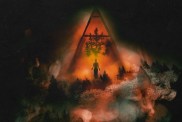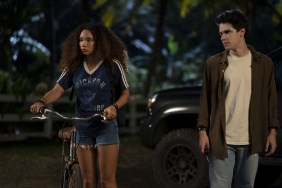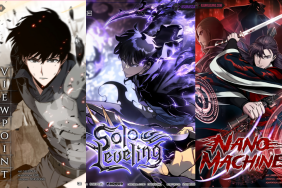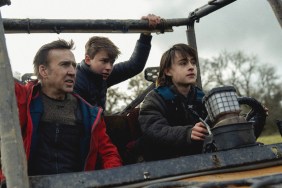When you see enough French films, you get some idea what to expect–lots of dialogue, plenty of drama and character development galore. Certainly that’s the case with novelist Philippe Claudel’s directorial debut I Loved You So Long, although there’s also something inherently different about the way the movie feels, as it’s been structured to get the strongest emotional response. Of course, a lot of that has to do with the powerhouse performances by the film’s star, Kristin Scott Thomas, and her co-star Elsa Zylberstein, playing two sisters reunited after fifteen years.
One really shouldn’t know too much about the plot before seeing the movie except that Thomas’ character Juliette was in prison for 15 years for committing a heinous crime, and Zylbenstein’s Léa is hoping to get reacquainted with her older sister by having her move in with her extended family. The idea might sound mundane, but watching Juliette try to reenter society and move on with her life, while facing the judgment of those around her, makes for fascinating film storytelling.
Ever since the film premiered at the Berlin Film Festival earlier this year, people have been citing it as one of the best performances of Thomas’ career, and it has received a similar response in Toronto and Telluride, getting Thomas shortlisted as a candidate to receive a second Oscar nomination. (Her first was for Anthony Minghella’s The English Patient over ten years ago.)
ComingSoon.net sat down with Ms. Thomas to talk about her movie and performance, and we were joined after a few questions by Claudel himself. They were a strange duo who expressed themselves very differently, but sadly, we didn’t have nearly enough time to ask Thomas for her thoughts on the upcoming Oscar race and her sudden prominence as a French star in this country after the success of her previous French film Tell No One and the strong response to this movie.
ComingSoon.net: I assume you’ve worked with a lot of first-time directors before Philippe…
Kristin Scott Thomas: Not really. I think it was perhaps my first or second time.
CS: It obviously must have been a really good script.
Thomas: It was a great script, and it was obvious the script was fabulous and a great story. I went into it slightly not knowing what was going to come out the other end, but I just thought the character was so interesting that I had to play the character. There are always different reasons for doing films. Sometimes it’s because you admire a director so much you want to be part of their oeuvre. Sometimes it’s just because a character grabs you, and sometimes it’s just that you want to go to that place. There are many many reasons and this was really because of the character.
CS: Did you meet Philippe and size him up to see if he’d be able to pull it off or had you met him before signing onto make the movie?
Thomas: Yeah, we’d met before… (At this point, Philippe joins us) It was through normal channels. My agent had sent me the screenplay and he just came and talked to me about it.
Philippe Claudel: Kristin was very reactive, very quickly after reading, and we met maybe two weeks after, I don’t remember, and I think maybe I had a good understanding of this story. I think we wanted to explore with an expressionist approach this part, and I wanted to give a lot of freedom to Kristin to explore this part. I wanted just to show a direction, but after the work, it was her work, and it was a big opportunity for me to work with Kristin, and to show another face of her talent. I remember the first thing I asked Kristin. It was, “Would you agree if I destroy your beauty?” (to Kristin) Do you remember? And she said, “Sure, it’s a part.” It’s a pleasure to work with an intelligent person. Yes, it was very easy to have a connection. I think Juliette is a really complex part, like everybody, and during the writing of the screenplay, I wanted to write about a mute person, a dead woman, and I think maybe for an actress, it’s an exciting challenge to work without words. And so, it was a big economy of work, an economy of direction…
Thomas: We even took stuff out. There was dialogue and sometimes we’d say, “Well, we don’t need to say that. We just do it.” So it became quieter and quieter and quieter.

CS: What about working with Elsa as your sister? A lot of people know your work but she’s a very new face to us. Can you talk about creating that tentative bond of being sisters having been separated for 15 years? It’s a very strange dynamic that drives the movie. Was there a lot of rehearsals involved in creating that?
Thomas: No, we didn’t, did we? We did one read-through and then we just went for it, but I think that happened in spite of ourselves, because Elsa doesn’t have sisters, she has a brother. I have two sisters, so I know about the sparring, I know the undercurrents that go with being sisters, I’m aware of them, I know them intimately. I think Elsa has a very idealized vision of sisterhood, so in fact, Elsa’s own vision and my own experience actually matched our characters… well, not quite because I’m not quite as savage as my character.
Claudel: I think it’s true, and I think it was very interesting the fact that Elsa idealized the idea of a relationship between sisters because it was the case between Juliette and Lea, the same thing.
CS: Since you’ve been a novelist for many years, why did you decide to write this as a screenplay, first of all, but then choose to direct it as well? A lot of novelists write screenplays but getting behind the camera requires such a different skill set.
Claudel: At the beginning, I wanted just to build pictures like a mirror of our life. Sometimes, I use language to build those pictures, sometimes I use colors because I’m very fascinated with painting and I paint, to, and sometimes, these pictures come in my mind with the instrument of movie-making. When I started to imagine the story of Juliette, it was the possibility of movie-making because I wanted to work with actresses, I wanted to work with flesh, I wanted to work with feelings, I wanted to work with silence. It’s impossible to work with the silence in novels, it’s more difficult. I have the desire to make a real teamwork. It’s very exciting and sometimes difficult, but during the shooting, it was almost constantly a pleasure. I know Kristin has said in other interviews that she’s a director’s nightmare, but I think she’s a sweet nightmare, you know? And a great nightmare. It’s not true, she’s wrong. Yes, it’s a real pleasure to choose different people and compose this team and try with this team to build the interior dream, and you’re at the same time alone and you’re at the same time with many, many people around you. With this communal energy, you try to do your best every day. She’s very demanding, and I’m demanding, too, and with the other people too, it was the same case.
Thomas: We had a really great DP… Jérôme Alméras, fantastic. I’d actually worked with him before, and so that was part of the trusting thing as well, because there are all sorts of unknown quantities in this project. The sound department were wonderful and I’d worked with them as well, and I had gotten the costume designer. It’s a small community, the French industry, so I knew lots of people on that set, but it’s true what Philippe is saying is that it really is teamwork making a film, and I think that’s the main difference between being a writer or a novelist or an essayist or a man who uses his brain and his pen is that you delegate so much. I think Philippe was really clever in choosing his team, because there wasn’t one person on that set who wasn’t completely affected by the story and wanted to give his version and get involved with the creation of the character and the film.
Claudel: Maybe it is the first responsibility of the director, maybe it was the most important thing at the beginning of the work, to compose a team. I knew Jérôme Alméras before, during the shooting of “Les Âmes grises,” which was an adaptation of one of my (novels) and at this time, we had a very good connection and we had the desire to work together. It was the same thing with different other people, but at the same time, it’s a miracle when (it works) and the result. I’m demanding that I want to control everything but at the same time, it’s important to be a little lost in your creation. Every day, in the evening, I was very happy because I knew we did a great job, and after the shooting, I knew that each take was great. With my first edit, the day before the screening of my first edit just with my editor, I was a little afraid, but I knew that each take (was good), but…
Thomas: It was hard to put it all together.

CS: When you first read his script, did it seem very different from other screenplays when you read it?
Thomas: It was quite different, because there was a lot of ellipsis and it kind of had its own flow that was… there’s no big event, the big event of the film, but it unfolds very, very gently. It doesn’t even unravel. There’s nothing chaotic about it. You get this scene and then you get that scene. It’s funny because it’s a film that’s quite mysterious at the same time, each scene is separately quite open and it’s quite clear what’s going on. I’m thinking of the scene right at the beginning when the little girl wants to read the poem. It’s very clear that this woman has had this terrible trauma and she cannot stand that child doing that to her. It starts off gently and then POOM, you get the (slaps hands together). Each scene has this kind of punch to it.
CS: It uses a very different structure than most other films I’d say as well.
Thomas: Because there’s also the time thing.
Claudel: It was very important to compose a puzzle. It’s different scenes, different pieces of life, of feelings, so there’s not a real structure and not a real way, but at the same time, I wanted to put a little bit of suspense at the beginning. When we discover Juliette, we don’t know exactly who she is, and when we discover her terrible act, we are totally afraid maybe, like Luc, the husband of Lea. I remember I wanted to play with this dimension. It’s very important to… I tried to do the same thing with different novels. It’s not really a crime-fiction or thriller but I take the suspense in hopes of catching the audience, and it was very important to put a little mystery in the beginning, and it was very funny to work with Kristin at the beginning, to compose a Hitchcockian resonance. (Kristin emphasizes this point by stabbing the air with a knife ala the famous scene from “Psycho.”) The house was very special, too.
Thomas: Yeah, the house was great.
CS: Were you able to film the movie in any kind of order or was it the usual case where you had to shoot by whatever location was available, and was there any room for improvisation and getting away from the script?
Thomas: Oh, there was a lot of improvisation that went on because we were shooting in HD, so Philippe discovered the joys of that, so what would happen is we’d have our scene and then he just wouldn’t stop, so we’d go on and on and on. With Fréderic Pierrot, the guy who plays the Inspector, whole new scenes were tacked onto the end of every scene, but it wasn’t particularly chronological except for the last scene of the film was shot on the last day, which was great, because it gave us all closure. Otherwise, you go home and with sort of unfinished business.
CS: I was curious about that and was that just worked out from the beginning that you’d save that climactic scene for the very end?
Claudel: I think it’s a good thing to shoot in non-chronological order because every day, it’s a challenge to find the real mood, except for the last scene, it was very important to shoot this one at the end of the movie because it’s a climax, it’s cathartic. It was very important to use the exhausted mood to build the truth of this scene.
And that’s all the time we had. I Loved You So Long opens in New York and L.A. on Friday, October 24.









